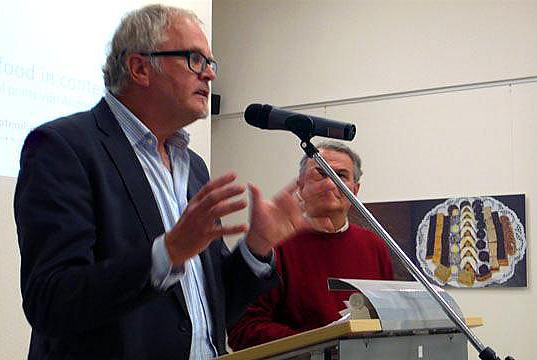Between Aesthetics And Morality

Mr. Erwin Miedtke gives a speech at the show opening in Stadtbibliothek, Bremen
The works of Andrej Tisma "Food in Context" in their subject
matter and various paraphrases show the world and criticize consumerism
and transience with a demand: "Art must have consequences"!
In art, the world becomes transparent only if a work of art - so to speak
- consumes it and if it touches or even hurts both the artist and us as
observers.
This is exactly what is being initiated by these works, which - in addition
to a social feature - deal with transience as well. Andrej Tisma presents
foodstuffs, food on decorated plates, dialectically as a product of culture
as well as a transient matter which is - with all its aesthetic features
- from the very beginning intended to perish, so to say destined to end
up in a waste container, together with 90 million tons of food stuffs
which are, only in the European Union, annually thrown away as garbage.
In cultural and historical comparison, Andrej Tisma with his works follows
the line of the transience motifs (Vanitas), which have ever since the
Renaissance placed on the top the conflict between man's humility and
man's ego - and here I would like to remind you of the great still lives
with fruits full of symbolics, dead animals and kitchen utensils, but
also of the 20th century Picasso's abstractions of objects and Warhol's
presentations of worthless objects such as the famous can.
Iconography has changed significantly since the Renaissance, but the basic
definition has remained and, through the social context in the artistic
provocation of Andrej Tisma, it has gained a new dimension. In his works,
he aims at an intellectual climate, at social responsibility and warns
on the intricate relationship between the freedom of an individual and
the economic and social determinants. He places this connection into the
focus of his artistic research and, in this way, with all the crashes,
a tie between aesthetics and morality can be determined.
In these images we can experience targeted provocation aimed at reflection,
and it holds true for both video works presented at the exhibition. The
first one, "Friendly Talk", was born in a context with prints:
photos of foodstuffs as excerpts from advertisements, news and magazines
Tisma brings in an ingenious way in alliance with the present, that is
with wars, environment pollution and sickness - conveying a message that
for him decomposition - disintegration of foodstuffs reflects the disintegration
of civilization.
The other video, "Bodies and Objects", let me find an appropriate
word, is shockingly brutal. It is a reflection upon life and death, slaughtering
of animals related to man's feeding and - as Andrej Tisma says - upon
the relativity of the condition of life and death; on the shortness of
our life in the context of transience and transition from one status to
another - and again in relation to the slaughtering of animals, often
only to provide a brutal benefit for others.
Erwin Miedtke
Deputy Director of the City Library of Bremen
Bremen, September 2011